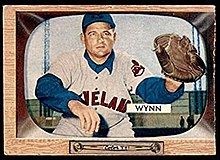Early Wynn
Wynn signed with the Senators at the age of 17, deciding to forgo completing his high school education to begin pursuing a baseball career.
Drafted into the military in 1944, Wynn missed all of 1945 and a portion of the 1946 season while serving in the United States Army during World War II.
Pitching coach Mel Harder taught him a curveball, slider, and knuckleball, which Wynn credited with helping him become a better pitcher in the 1950s.
He won 20 or more games in four of his seasons with the Indians, helping them set an American League (AL) record with 111 total wins in 1954.
He picked up his 300th victory against the Kansas City Athletics on July 13, his last major league win, though he remained on the roster for the rest of the season.
[4] As a youth, Wynn lifted 500-pound bales of cotton one summer for 10 cents an hour; the experience left him determined to make a different living for himself.
Excelling at both football and baseball, Wynn was about to become the top running back at Geneva County High School as a sophomore, but he suffered a broken leg on a punt return that year.
[9] Wynn made three starts, posting an 0–2 record and a 5.75 earned run average (ERA) before returning to the minor leagues for 1940 and most of 1941.
[11] In his first start of the year, the second game of a doubleheader against the Philadelphia Athletics, he gave up two runs and six hits, earning his first major league win in a 4–2 Senator victory.
[19] Four days later, in the second game of a doubleheader against the St. Louis Browns, Wynn hit his first major league home run against Bob Muncrief.
[25] He had a 6–7 record entering June 29 but would lose 10 decisions in a row starting from that date and lasting through August 13, when he finally won another game.
He underwent 17 weeks of training at Fort Knox before going to the Philippines to serve in the Tank Corps during World War II.
[1][8][28] Though he missed the 1945 major league season, Wynn continued to play baseball, pitching for a Pacific Army team known as the Manila Dodgers.
[29][30] He pitched 11 innings against the Yankees in the first game of a doubleheader on September 8, allowing only one run (unearned) and earning the victory in Washington's 2–1 triumph.
[1] In December, Wynn and Mickey Vernon were sent to the Cleveland Indians in exchange for Joe Haynes, Ed Klieman and Eddie Robinson.
"[1] With Cleveland, he developed into a key part of what Fleitz called "one of the greatest pitching rotations of all time," joining Feller, Bob Lemon and Mike Garcia.
[10] The Indians won 111 regular season games during 1954, breaking an AL record previously held by the 1927 New York Yankees and earning Wynn his first playoff appearance.
[10] Wynn's 17 wins were tied with Turley for fourth in the AL (three pitchers had 18), his 2.82 ERA was third (behind Pierce's 1.97 and Whitey Ford's 2.63), and his 122 strikeouts ranked seventh.
[10] In the first game of a doubleheader against the Tigers on April 28, 1957, Wynn took the loss but allowed just two runs and struck out a season-high 10 hitters.
[1][109] On May 1, Wynn became the second pitcher in major league history to win a game 1–0 while recording at least ten strikeouts and hitting a home run; Red Ruffing had done the same for the Yankees in 1932.
[1] Wynn served as the starting pitcher in the first All-Star Game of the year on July 7, allowing one run in three innings and receiving a no-decision as the National League defeated the AL 5–4.
[113] Facing the Indians on September 22, Wynn picked up his 21st win, a victory that clinched the AL pennant for the White Sox.
[119] He finished the 1960 season with a 13–12 record (his fewest wins since 1949), a 3.49 ERA, and 158 strikeouts, the third-highest total in the AL (behind Bunning's 201 and Pedro Ramos's 160).
[124] He held Baltimore scoreless and pitched seven shutout innings with six strikeouts on July 22 but received a no-decision; the White Sox won 7–4.
[131] The night before his fourth start of the year, against the Athletics on July 13, Wynn struggled to sleep due to gout-related pain.
Opposing Kansas City batter Ed Charles recalled Wynn's performance: "His fastball, if it reached 80, that was stretching it.
Wynn gave up an RBI single to Jim Fregosi, then got Charlie Dees to line out to shortstop to end the inning.
When he was replaced by Lorn Brown in December 1983, White Sox president Eddie Einhorn described Wynn as "a link to baseball's past.
[138] In 2013, the Bob Feller Act of Valor Award honored Wynn as one of 37 Baseball Hall of Fame members for his service in the United States Army during World War II.
"[c][161] His attitude was encouraged early in his career by manager Bucky Harris, who ordered Wynn to throw brushback pitches[d] when he got two strikes on a batter.

